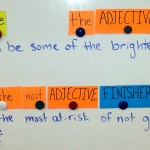A few weeks back I was chatting with a gifted education specialist in our district, an excellent teacher my son was lucky enough to have in elementary school. I asked him some questions that had been in the back of my mind about English Learners and gifted education, and whether the district identified a lot of EL’s as gifted and talented. He said that the district was working on this issue and developing some strategies to improve in this area. He seemed eager to pursue the issues, and yet our conversation uncovered some interesting dilemmas for junior high-aged students.
Although my 7th and 8th grade students struggle academically, every year there are one or two shining stars who I can tell are only waiting for the words to share all that they are learning and thinking. Some are talented visual artists who sketch in endless notebooks, and remind me that it is library day, eager to find out if the book in the series they are reading is back on the shelf yet. Others are dancers or comedians, picking up conversational English as easily as they learn to enjoy a new junk food. Yet others are somehow able to learn math concepts fluently, even though the instruction they receive is all in English, which they barely understand.
The United States Department of Education defines gifted education as serving students “endowed with a high degree of mental ability or who demonstrate unusual physical coordination, creativity, interest, or talent.” Many of my notable ELD students have a solid educational and literacy background in their home language, but many face huge gaps and other obstacles. However, their gifts and enthusiasm for learning quickly reveal themselves to teachers who care to notice.
Research has begun to reveal the gaps in identification of gifted and talented students among English Learners, and work is being done to identify more of them. Corey Mitchell of EdWeek suggests “Four Steps Schools Should Take to Identify Gifted English Learners.”
But here is the thing. I teach in a junior high school. In our district as in just about every other district I know, after elementary school, gifted education morphs into “honors classes,” or other similar concepts such as International Baccalaureate programs and Pre-AP and Advanced Placement classes. My English Learners would crash and burn in an honors level class or team. I have been in enough IEP meetings with twice-exceptional learners (gifted students who also require other learning services or accommodations), to know that on a practical level, succeeding in honors courses requires somehow managing not only challenging coursework, but also a massive amount of rigorous reading and writing. In this system, cutting back on homework to lower anxiety or account for slower processing in some areas is not really practical, no matter what needs are documented. Teachers generally end up suggesting that perhaps the student is not ready to succeed in honors level classes, despite being gifted. Although I haven’t formulated a solution, I have often gritted my teeth and wished that others agreed with me about the least restrictive environment. I am sure there are teachers and schools that do, but overall, honors classes are still held up as being, among other things really, really hard and unyielding.
In our current system, I have a hard time envisioning a student in the required four hours of English language development courses filling out her schedule with 8th grade algebra, honors English and honors science.
So where does that leave an academically bright adolescent English Learner who moves rapidly through the conventions of English so that she can read her favorite young adult science fiction graphic novel series, but who could not keep up with a typical honors class? In other words, in 7th grade, what is the benefit of using all kinds of metrics to identify a gifted English Learner? What services would she receive were she identified? How would her education be enriched? There are no good answers to that question, and, sadly, we are talking about such a small number of students in any school that in all likelihood, those students will not be documented or officially identified. There may be some merit in having them tested for their abilities, but they will not be recruited for any special programs.
The good news is that the majority of these stars will learn quickly and will move out of ELD rather rapidly. They will be ready for high school and may even pursue high level coursework at some point. However, it will be up to perceptive teachers, counselors and other school staff to notice these students and encourage them, nurture them when they learn Korean using YouTube and Google Translate (while speaking Spanish and learning English in class, and signing up for Chinese Club), cheer them on in the talent show, sneak them good books on the weekends, let them play with coding and other digital tools when they finish their schoolwork, and encourage them in their musical or athletic pursuits. Hopefully over time, larger districts and schools can better strategize around building up these students’ opportunities to learn at high levels, but for now it will simply be joyous part of teaching the diverse group of secondary students in front of us each day.











Comments 2
I worry about our English Learners and the 4 hour block requirement. As a music teacher, I have the opportunity to see them come into my class and be immediately successful. I know that is not the case in many areas of school. I work to find folk songs and games from their culture and encourage them to “help” us understand the game and the history of it. Thank you for tackling this topic. There are no easy or immediate answers, we just have to be one person who embraces and celebrates their difference!
I worry about them, too. I am sure that your students who are still learning English LOVE learning music from you!
Definitely no easy answers. It’s just another great reason to have highly trained, professional teachers in the classroom. These students get written off so often, or placed in remedial courses. Breaks my heart.